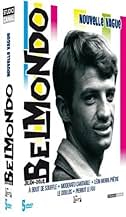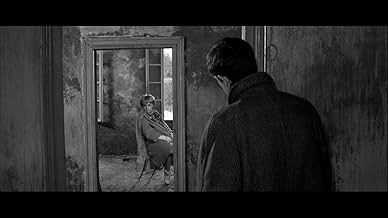IMDb RATING
6.9/10
1.4K
YOUR RATING
A wealthy, bored woman witnesses a murder in affection and meets another witness. She asks him about the history of the victim and falls in love with him.A wealthy, bored woman witnesses a murder in affection and meets another witness. She asks him about the history of the victim and falls in love with him.A wealthy, bored woman witnesses a murder in affection and meets another witness. She asks him about the history of the victim and falls in love with him.
- Awards
- 1 win & 1 nomination total
Featured reviews
Moderato cantabile (1960) was shown in the U.S. with the title Seven Days . . .Seven Nights. Peter Brook directed this French film, and Marguerite Duras adapted her novel for the screen. (Note that IMDb has the film listed with its U.S. title, although the VHS uses the original French title, and lists the date of release as 1959.)
The plot of the movie is somewhat basic. A beautiful woman leads a banal life as the trophy wife of a town's leading industrialist. Her only pleasure is her interactions with her son, Pierre, who is about seven years old. (The title Moderato Cantabile comes from the son's piano teacher, who is trying to get him to understand the concept.)
Within the first few minutes of the film, a horrible scene occurs in a bar right next to the piano teacher's home. For the rest of the film, the plot keeps circling back to discussion that event. We assume something bad is going to happen, although we don't know what.
Jeanne Moreau plays the wife, Anne, and Jean Paul Belmondo plays Chauvin, someone who works in her husband's factory. They meet and discuss the event, and then we watch their relationship unfold.
This would be just another black and white French film from the 1950's, except that it stars Moreau and Belmondo. Belmondo is a formidable masculine presence, with his high cheekbones and his broken nose. Moreau is unique--certainly one of the great actors of the 20th Century.
Director Brooks knows that when he is working with Moreau he is working with an extraordinary actor, and he lets us know that he knows. In one scene, there's a single image of Moreau's face that fills the screen. That single image is on the screen for almost 30 seconds! Those large eyes and downturned mouth are a part of French and worldwide cinematic culture.
I want to make note of Didier Haudepin, who plays Moreau's son, Pierre. He's an extraordinary child actor, because he looked as if he weren't acting. He had a major role in the movie, but it appeared that he was just a normal kid who didn't like piano lessons. It's hard for an actor-- especially a child--to look as if he weren't acting. Haudepin managed it, and it's no surprise that he went on to have an outstanding career in film.
We saw this movie on VHS cassette, but it's available on DVD. It's an excellent film, and definitely worth seeking out and viewing.
P.S. We became interested in Moderato Cantabile because years ago we acquired an original movie poster of the film. We eventually donated the poster to the excellent Little Theatre in Rochester, NY. If you attend The Little, you'll see it prominently displayed. Our thought to ourselves was--you've seen the poster, now watch the movie!
The plot of the movie is somewhat basic. A beautiful woman leads a banal life as the trophy wife of a town's leading industrialist. Her only pleasure is her interactions with her son, Pierre, who is about seven years old. (The title Moderato Cantabile comes from the son's piano teacher, who is trying to get him to understand the concept.)
Within the first few minutes of the film, a horrible scene occurs in a bar right next to the piano teacher's home. For the rest of the film, the plot keeps circling back to discussion that event. We assume something bad is going to happen, although we don't know what.
Jeanne Moreau plays the wife, Anne, and Jean Paul Belmondo plays Chauvin, someone who works in her husband's factory. They meet and discuss the event, and then we watch their relationship unfold.
This would be just another black and white French film from the 1950's, except that it stars Moreau and Belmondo. Belmondo is a formidable masculine presence, with his high cheekbones and his broken nose. Moreau is unique--certainly one of the great actors of the 20th Century.
Director Brooks knows that when he is working with Moreau he is working with an extraordinary actor, and he lets us know that he knows. In one scene, there's a single image of Moreau's face that fills the screen. That single image is on the screen for almost 30 seconds! Those large eyes and downturned mouth are a part of French and worldwide cinematic culture.
I want to make note of Didier Haudepin, who plays Moreau's son, Pierre. He's an extraordinary child actor, because he looked as if he weren't acting. He had a major role in the movie, but it appeared that he was just a normal kid who didn't like piano lessons. It's hard for an actor-- especially a child--to look as if he weren't acting. Haudepin managed it, and it's no surprise that he went on to have an outstanding career in film.
We saw this movie on VHS cassette, but it's available on DVD. It's an excellent film, and definitely worth seeking out and viewing.
P.S. We became interested in Moderato Cantabile because years ago we acquired an original movie poster of the film. We eventually donated the poster to the excellent Little Theatre in Rochester, NY. If you attend The Little, you'll see it prominently displayed. Our thought to ourselves was--you've seen the poster, now watch the movie!
Two beautiful ugly ones, or two ugly beautiful ones, a perfect couple on the screen. Neither Belmondo nor Jeanne Moreau were beauties, they had an immense personal charm that made them likeable. Plus a great talent in expressing with terrible ease what thousands of other actors struggle in vain to express. Both, Moreau and Belmondo, did not even need words, they could convey enormously just by their presence, just by a look. Two geniuses of cinematography who delighted my childhood in particular and my adult life, I saw almost all their films, only this "Moderato Cantabile" was missing because, made in 1960, I was too young, I was less than 2 years old at the time and I don't even know if it was in the cinemas in Bucharest. I found it on YouTube now in March 2025 and watched it with great interest, although I was very tired, with many hours of sleep minus. A very delicate film that is worth seeing. However, knowing the extremely low intellectual level of today, it will only be of interest to those who know who Moreau and Belmondo were.
"Moderato Cantibile" was only the second film by the great British director Peter Brook and it proved, like Welles before him, that he was equally adept in either medium. It was made in France in 1960 and has now largely been forgotten, though at the time the magazine Films and Filming selected it as the best film of the year from any source and it's a masterpiece. It's also one of the most beautiful black and white films to be made in the Cinemascope format. (Armand Thirard was the DOP).
It's about a respectable,if unhappily married, woman in a grim little coastal town in France who drifts into an affair of sorts with a man from farther down the social ladder. They are played, magnificently, by Jeanne Moreau and Jean-Paul Belmondo. The oblique, brilliant screenplay is by Marguerite Duras and Gerard Jarlot from a novel by Duras and anyone remotely interested in cinema as an art-form should seek it out.
It's about a respectable,if unhappily married, woman in a grim little coastal town in France who drifts into an affair of sorts with a man from farther down the social ladder. They are played, magnificently, by Jeanne Moreau and Jean-Paul Belmondo. The oblique, brilliant screenplay is by Marguerite Duras and Gerard Jarlot from a novel by Duras and anyone remotely interested in cinema as an art-form should seek it out.
for the Duras's atmosphere. for the lead actors. for the story, landscapes, dialogs, the piano lesson or for its end. for the illustration of a state of soul as result of a mixture of sin, fear, high expectations and fall. a film about a woman and a man. all in simple manner presented. a town. and few meetings. and level of dark revelation. a film of silhouettes and silence. and it is enough for discover an universe who could be part from yourself. a film about choices. and about a strange form of music. Jeanne Moreau is not a surprise. Belmondo is the perfect choice despite the expectations about other actor if you read the novel. the result - not comfortable but good occasion for reflection. about love. and about versions of Madame Bovary.
the atmosphere. the Duras mark. the mark of Peter Brooks. and the performances. a Belmondo who conquest a special status, exploring a role who has the force of nuances. Jeanne Moreau - the same and different. the piano's lessons. and the city. a film about solitude in a honest, cruel manner. slices from Madame Bovary. and the search of sense in the presence of the other. the mixture of temptation and fear, expectation and sin, the form of illusion and the brutal end does it a gem. not only for the artistic virtues but for a special manner to use the novel for the portrait of a small world. a film of music as piece from silhouettes, dialogs and fall. a not real comfortable film. but useful.
Did you know
- TriviaAccording to biographer Olivier Todd, Peter Brook offered writer Albert Camus an acting job in Moderato cantabile. Camus died in a car accident before he could take it.
- GoofsIn original release copies the title card read "Moderato contabile", but they were not retired from circulation.
- Quotes
Anne Desbarèdes: Try to remember: Moderato means gently - it's nearly the same - and Cantabile means melodiously. It's easy.
- ConnectionsFeatured in Jeanne M. - Côté cour, côté coeur (2008)
- How long is Seven Days... Seven Nights?Powered by Alexa
Details
- Release date
- Countries of origin
- Language
- Also known as
- Stunden voller Zärtlichkeit
- Filming locations
- Production companies
- See more company credits at IMDbPro
- Runtime
- 1h 31m(91 min)
- Color
- Aspect ratio
- 2.35 : 1
Contribute to this page
Suggest an edit or add missing content

























